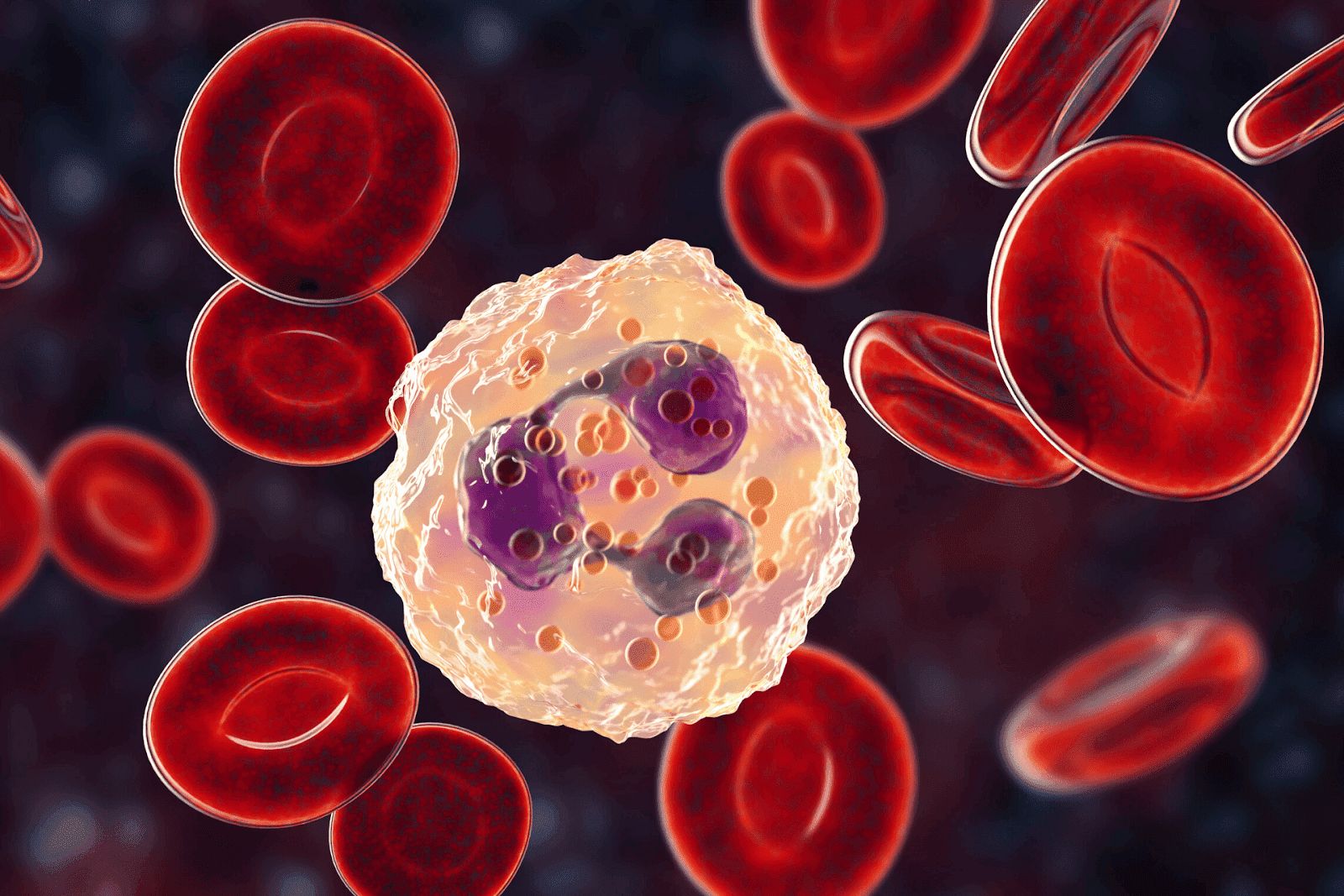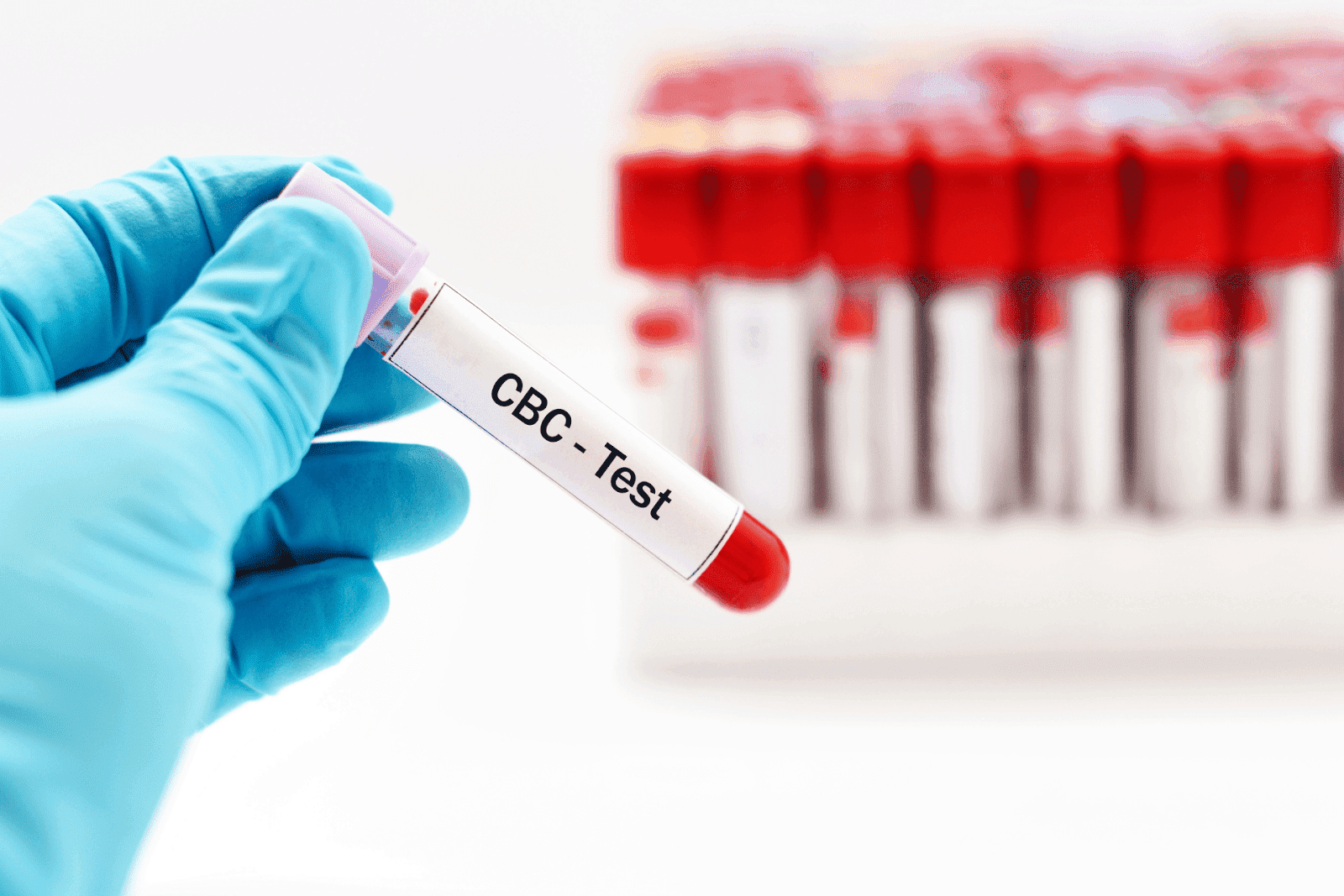What Does a High Neutrophil Count Mean?
Neutrophils are a type of white blood cell that play a crucial role in the body's immune system. They are one of the first responders to infections and help fight off [...]
Read More
Medically reviewed by Alan Lucks | MD, Alan Lucks MDPC Private Practice - New York on October 12th, 2025.
Normal neutrophil levels range from 1,500-8,000 cells per microliter, representing 50-70% of total white blood cells as your body's first-line bacterial defense system.
Bacterial infections like pneumonia and UTIs trigger the most dramatic elevations, while physical stressors including surgery, intense exercise, or burns cause moderate temporary increases.
Certain medications produce predictable neutrophilia—corticosteroids can double counts within hours, while lithium causes chronic elevation in 20-30% of patients taking it long-term.
A complete blood count with differential reveals not just total numbers but also shows "left shift" when immature neutrophils flood circulation during severe infections.
Persistent elevation above 12,000 cells per microliter lasting beyond 2-3 weeks after treating obvious causes warrants investigation for blood disorders or hidden chronic inflammation.
Neutrophils are a type of white blood cell that play a crucial role in the body's immune system. They are one of the first responders to infections and help fight off bacteria and other harmful invaders. When your doctor orders a blood test, one of the components they often check is the neutrophil count. But what does it mean if your neutrophil count is high? Understanding this can help you better grasp your health status and decide when to seek medical advice.
Neutrophils make up about 50 to 70 percent of all white blood cells in the bloodstream. Their primary job is to identify and destroy bacteria, fungi, and other pathogens. When an infection or inflammation occurs, neutrophils rush to the site to neutralize the threat. This process is vital for protecting the body against illness and promoting healing.
Because neutrophils are so essential in fighting infections, their numbers can fluctuate based on your body’s needs. A high neutrophil count, also known as neutrophilia, often signals that your immune system is actively responding to something.
Neutrophils are equipped with a variety of tools to combat pathogens. They can engulf and digest microbes through a process called phagocytosis, where they surround and internalize the invaders, breaking them down with powerful enzymes. Additionally, neutrophils can release reactive oxygen species and antimicrobial peptides that help to kill bacteria and fungi directly. This multifaceted approach not only helps to eliminate pathogens but also plays a crucial role in orchestrating the overall immune response, signaling other immune cells to join the fight.
Interestingly, neutrophils have a relatively short lifespan, typically living only a few hours to a few days. This rapid turnover is essential for maintaining a robust immune response, as older neutrophils undergo a process called apoptosis, or programmed cell death, to ensure that only the most effective cells are active in the bloodstream. Furthermore, the bone marrow continuously produces new neutrophils to replace those that have died, ensuring a steady supply ready to respond to infections. This dynamic nature of neutrophils highlights their critical role not only in immediate defense against pathogens but also in the overall maintenance of immune system health.
 Common Causes of a High Neutrophil Count
Common Causes of a High Neutrophil CountThe most common reason for an elevated neutrophil count is an infection. Bacterial infections, in particular, tend to trigger a rapid increase in neutrophils as the body mobilizes its defenses. Viral infections can sometimes cause neutrophilia, although they more commonly increase the levels of other white blood cells.
Examples of infections that may cause a high neutrophil count include pneumonia, appendicitis, urinary tract infections, and sepsis. In these cases, the rise in neutrophils is a natural and necessary response to fight off the invading microorganisms. The body’s ability to produce and release neutrophils in response to infection is a critical aspect of the innate immune system, showcasing the remarkable efficiency of our biological defenses. In severe infections, the neutrophil count can be significantly elevated, sometimes exceeding 20,000 cells per microliter of blood, indicating a robust response to combat the pathogens.
Inflammatory conditions such as rheumatoid arthritis or inflammatory bowel disease can also lead to neutrophilia. Inflammation signals the immune system to activate, and neutrophils play a crucial role in this response. Chronic inflammation can create a persistent elevation in neutrophil levels, which may contribute to tissue damage if not properly managed.
Physical stressors like intense exercise, trauma, or surgery may temporarily raise neutrophil levels. This is because the body perceives these events as stressors requiring an immune response. Interestingly, research has shown that even moderate exercise can lead to a temporary increase in neutrophil counts, which is part of the body’s adaptive response to enhance immunity. However, excessive physical stress without adequate recovery can lead to a state of chronic inflammation, further complicating the body’s ability to regulate neutrophil production effectively.
Certain medications, including corticosteroids and some types of adrenaline, can increase neutrophil counts. Smoking and pregnancy are other factors that might contribute to elevated levels. In pregnant women, the body undergoes numerous physiological changes, including alterations in blood cell production, which can lead to increased neutrophil levels as a protective mechanism for both the mother and the developing fetus.
In rare cases, a high neutrophil count may be linked to bone marrow disorders or cancers such as leukemia. These conditions require prompt medical evaluation and treatment. The bone marrow, responsible for producing blood cells, can become dysfunctional in these diseases, leading to abnormal increases in neutrophil production. Monitoring neutrophil levels can be crucial in the diagnosis and management of these serious conditions, as they may indicate the progression of disease or the effectiveness of treatment strategies. Understanding the underlying causes of neutrophilia is essential for healthcare providers to tailor appropriate interventions and support for affected individuals.
Often, a high neutrophil count itself does not cause symptoms. Instead, symptoms usually relate to the underlying cause, such as fever, pain, swelling, or fatigue. If you experience persistent or severe symptoms, it is important to consult a healthcare provider for a thorough evaluation.
Thanks to advances in telehealth, you can now get quick and reliable medical advice without leaving your home. Doctronic.ai offers 24/7 access to experienced doctors who can help interpret your lab results, answer your questions, and guide you on the next steps. This can be especially valuable if you have concerns about your neutrophil count or other health issues.
A high neutrophil count is typically discovered through a complete blood count (CBC) test. This routine blood test measures various components of your blood, including red blood cells, white blood cells, and platelets.
If your CBC shows neutrophilia, your doctor will likely investigate further to determine the cause. This may include additional blood tests, imaging studies, or a physical examination. The goal is to identify whether the increase is due to a benign condition like a mild infection or something requiring more intensive treatment.
 Treatment and Management of Neutrophilia
Treatment and Management of NeutrophiliaTreatment depends entirely on the underlying cause of the high neutrophil count. If an infection is responsible, antibiotics or antiviral medications may be prescribed. Inflammatory conditions might require anti-inflammatory drugs or immune-modulating therapies.
For individuals with chronic or unexplained neutrophilia, ongoing monitoring and specialist consultation may be necessary. The good news is that many causes of high neutrophil counts are manageable and often resolve with appropriate care.
In today’s fast-paced world, getting timely and accurate medical advice is more important than ever. AI-powered platforms like Doctronic.ai are revolutionizing healthcare by providing instant, evidence-based answers to your health questions. Unlike traditional telehealth services that rely solely on human doctors, Doctronic combines cutting-edge artificial intelligence with expert medical knowledge to offer personalized care.
With Doctronic, you can get a comprehensive AI-driven diagnosis and treatment recommendations in seconds. This is particularly helpful if you have a high neutrophil count and want to understand what it means without waiting days for an appointment. You can also schedule affordable video visits with licensed doctors anytime, anywhere in the United States, making healthcare accessible and convenient.
A high neutrophil count usually indicates that your immune system is responding to infection, inflammation, or stress.
Common causes include bacterial infections, inflammatory diseases, physical stress, and certain medications.
Symptoms are generally related to the underlying condition rather than the neutrophil count itself.
A complete blood count (CBC) test is used to detect neutrophilia, followed by further evaluation to determine the cause.
Treatment focuses on addressing the root cause and may involve antibiotics, anti-inflammatory drugs, or other therapies.
AI-powered telehealth services like Doctronic.ai provide fast, reliable, and personalized medical advice, helping you understand your health better and take prompt action.
A high neutrophil count is an important marker that signals your body is actively fighting something or responding to stress. While it can be concerning to see abnormal lab results, understanding what neutrophilia means can help you stay informed and proactive about your health.
If you ever receive a lab report showing a high neutrophil count, consider using trusted telehealth services like Doctronic.ai to get quick, expert insights. This innovative platform leverages the latest in AI and modern medicine to provide personalized care and answers, empowering you to make the best decisions for your health.
Remember, your health is your most valuable asset. Staying informed and seeking timely medical advice can make all the difference in maintaining your well-being.
Don't let a high neutrophil count leave you with unanswered questions. Take control of your health by visiting Doctronic, the #1 AI Doctor, for a free AI doctor visit. Our platform offers immediate, personalized medical insights, drawing from the most current, peer-reviewed medical research. With over 10 million users and growing, Doctronic provides not only the fastest and smartest healthcare answers but also the most personal care experience available. Skip the line. Talk to an AI Doctor Now, for free.
Most high neutrophil counts reflect your immune system appropriately responding to bacterial infections, medications, or physical stress and normalize within days to weeks of treatment. Seek evaluation if elevation persists beyond expected recovery time or accompanies unexplained fever and fatigue. If you're concerned about abnormal blood work results, Doctronic can help you understand what your specific numbers mean.
Neutrophils are a type of white blood cell that play a crucial role in the body's immune system. They are one of the first responders to infections and help fight off [...]
Read More